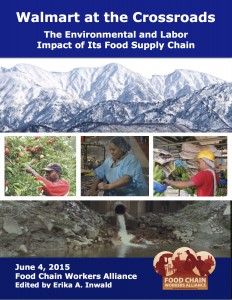 On June 4, 2015 the day before Walmart’s annual shareholder meeting, FCWA released new report that finds a major discord between Walmart’s labor and environmental claims and the reality in its food supply chain and provides recommendations for improvements.
On June 4, 2015 the day before Walmart’s annual shareholder meeting, FCWA released new report that finds a major discord between Walmart’s labor and environmental claims and the reality in its food supply chain and provides recommendations for improvements.
“Walmart at the Crossroards: the Environmental and Labor Impact of Its Food Supply Chain” examines Walmart’s labor and environmental “codes of ethics” for its suppliers as well as its goal of benefiting farmers via local food purchases. The study looks closely Walmart’s impact on farmers and at the labor and environmental records of 22 major suppliers of popular food items – suppliers include Flowers Foods, Taylor Farms, Tyson, and United Natural Foods, Inc. The report findings underscore Walmart’s priority on profits at the expense of genuine enforcement of its suppliers’ compliance with the code of ethics and over its goals for environmental sustainability and helping local farmers.
Walmart has recently taken steps in the right direction, such as last year’s announcement to sign on to the Coalition of Immokalee Workers’ Fair Food Program that has implications for farmworkers and a May 22, 2015, announcement by Walmart officials that it will ask its suppliers to animal welfare standards. However, Walmart is now at a crossroads. Will they do the right thing and ensure that their code of ethics is independently verified, or will they continue to use PR as the strategy to address real human suffering and environmental devastation? We are calling on Walmart to truly enforce its labor and environmental standards and to strengthen them, based on the recommendations in our report.
The findings of the study compelled us to launch a new petition with the report on, demanding that Walmart treat workers and farmers in its food supply chain with dignity and respect and to improve its environmental and animal welfare standards. Walmart is the world’s largest retailer and one of the most highly valued publicly traded companies. Foodstuffs currently account for over half of Walmart sales, representing roughly 25% of all groceries sold in the U.S.
